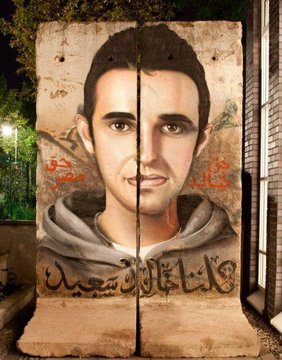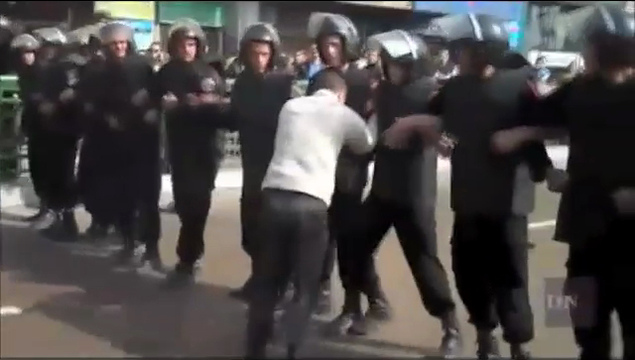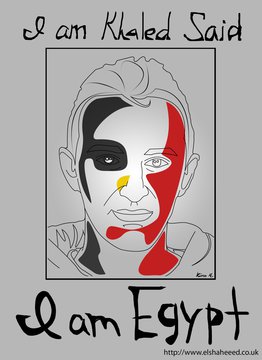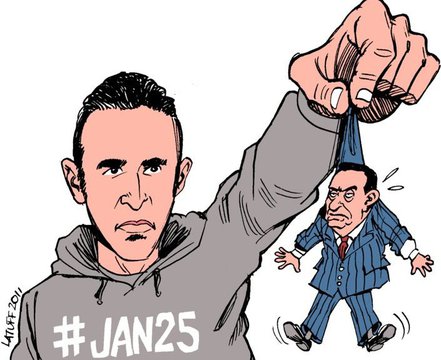Search results for 'state+repression'
Khaled Said
We are all Khaled Said
We are all Khaled Said
Hands Up United - Why has nothing changed? (January 2026)
Ferguson is everywhere. From St. Louis to Ayotzinapa to Palestine, millions are rising together to resist discrimination and State terrorism.
We Interrupt This Program
Deep Dish TV and Paper Tiger TV to Release New Video Series About Resistance to Rise of Far-Right Political Movements.
We Interrupt this Program brings together reports from frontlines of fight against white nationalism, neoliberalism, patriarchy, and colonialism.
From the Blogosphere to the Street: The Role of Social Media in the Egyptian Uprising
While the uprising in Egypt caught most observers of the Middle East
off guard, it did not come out of the blue. The seeds of this
spectacular mobilization had been sown as far back as the early 2000s
and had been carefully cultivated by activists from across the
political spectrum, many of these working online via Facebook, twitter,
and within the Egyptian blogosphere. Working within these media,
activists began to forge a new political language, one that cut across
the institutional barriers that had until then polarized Egypt's
political terrain, between more Islamicly-oriented currents (most
prominent among them, the Muslim Brotherhood) and secular-liberal ones.
A Brief History of the Noborder Network
It wasn't exactly the right place nor really the right time to launch a political campaign which publicly called for a series of offenses against the law, yet when the call "No one is illegal" went out exactly five years ago at documentaX, the usual reservations counted little. In the Orangerie which had been temporarily arranged as a media laboratory, at the end of the visitors' course of the well-known Kassler art exhibition, a dozen political and media activists from all Germany's bigger cities met up at the end of June 1997 in order to publish an appeal.
ReadEscaping Assad and Revolution in Rojava
An interview with a Syrian activist in exile, code-named Sami, published by Occupy.com draws attenton once more to the radical experiment in real-life bottom-up matriarchal democratic design unfolding against all odds in the autonomous Kurdish region of Rojava in Northern Syria. We are republishing two short texts here on this subject matter to speculate about the question if 'Rojava' could offer a repeatable model for post-governmental political design?
Indonesia: The Web as a Weapon
CAPABLE OF cutting through time and space, the Internet offers a means of communication not previously dreamed of. It has created important new possibilities as it shrinks distances and provides an astounding volume and variety of information to those who have computer access. One result of these is the acceleration of the development of solidarity networks among peoples, regions, and countries. In Indonesia, it has even managed to help topple a strongman who, until his unscheduled resignation in May 1998, had been Asia's longest reigning postwar ruler. To Indonesia's powers that be, controlling the Internet has become close to being an obsession.
ReadWhen Thought Becomes Crime*
March 17th, 2005
How did it come to this?
Only a perverse authoritarian logic can explain how Critical Art
Ensemble (CAE) can at one moment be creating the project "Free Range
Grain" for the Risk exhibition at Schirn Kunsthalle in Frankfurt,
reconfiguring it for The Interventionists exhibition at Mass MoCA in a
second moment, and then suddenly have a CAE member in FBI detention.
The U.S. Justice Department has accused us of such shocking crimes as
bioterrorism, health and safety violations, mail fraud, wire fraud, and
even murder. Now, as we retool "Free Range Grain" for the Risk
exhibition at the Glasgow Center for Contemporary Art, the surreal
farce of our legal nightmare continues unabated.
The Californian Ideology
"Not to lie about the future is impossible and one can lie about it at will"
- Naum Gabo [1]
We are all Khaled Said
Against torture in Egypt and inhuman treatment of Egyptians in their own country
"It's Khaled Said...
He is a 28 years old Egyptian who was tortured and killed by two policemen in the street where he lived in Alexandria, Egypt. Khaled's death further exposed the Egyptian police brutality and their systematic torture of Egyptians. Khaled died, but many Egyptians have become alive where his picture has now become the symbol of Egyptians' struggle for their rights and freedom."





